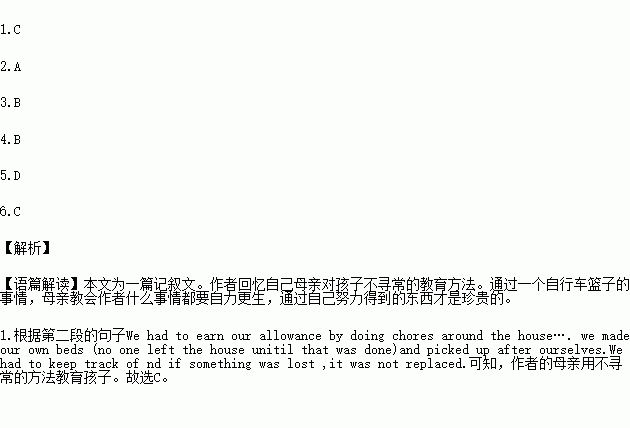题目内容
D
Two things changed my life: my mother and a white plastic bike basket. I have thought long and hard about it and it’s true. I would be a different person if my mom hadn’t turned a silly bicycle accessory into a life lesson I carry with me today.
My mother and father were united in their way of raising children, but it mostly fell to my mother to actually carry it out. Looking back, I honestly don’t know how she did it. Managing the family budget must have been a very hard task., but she made it look effortless. If we complained about not having what another kid did, we’d hear something like, “I don’t care what so –and –so got for his birthday, you are not getting a TV in your room a car for your birthday a lsvish sweet 16 party.” We had to earn our allowance by doing chores around the house. I can stil l remember how long it took to polish the legs of our coffee table.My brothers can no doubt remember hours spent cleaning the house .Like the two little girls growing up at the White House,we made our own beds (no one left the house unitil that was done)and picked up after ourselves.We had to keep track of our belongings ,and if something was lost ,it was not replaced.
It was summer and ,one day ,my mother drove me to the bike shop to get a tire fixed---and there it was in the window, White, shiny, plastic and decorated with flowers ,the basket winked at me and I knew ----I knew---I had to have it.
“It’s beautiful,” my mother said when I pointed it out to her,”What a neat basket.”
I tried to hold off at first ,I played it cool for a short while. But then I guess I couldn’t at and it any longer:“Mom, please can I please ,please get it? I ‘ll do extra chores for as long as you say, I’ll do anything ,but I need that basket,I love that basket.Please ,Mom .Please?”
I was desperate.
“You know,” she said ,gently rubbing my back while we both stared at what I believes was the coolest thing ever,” If you save up you could buy this yourself.”
“By the time I make enough it’ll bu gone!”
“Maybe Roger here could hold it for you,” she smiled at Roger ,the bike guy.
“He can’t hold it for that long ,Mom .Someone else will buy it .Please, Mom,Please?”
“There might be another way,” she said.
And so our paying plan unfolded. My mother bought the beautiful basket and put it safely in some hiding place I couldn’t find. Each week I eagerly counted my growing saving increased by extra work here and there (washing the car ,helping my mother make dinner, delivering or collecting things on my bike that already looked naked without the basket in front).And then ,weeks later ,I counted ,re-counted and jumped for joy. Oh ,happy day ! I made it! I finally had the exact amount we’d agreed upon….
Days later the unthinkable happened. A neighborhood girl I’d played with millions of times appeared with the exact same basket fixed to her shiny ,new bike that already had all the bells and whistles. I rode hard and fast home to tell my mother about this disaster. This horrible turn of events.
And then came the lesson . I’ve taken with me through my life:”Honey, Your basket is extra-special,” Mom said, gently wiping away my hot tears.”Your basket is special because you paid for it yourself.”
1.What can we learn from the first two paragraphs?
A. The children enjoyed doing housework.
B.The author came from s well-off family
C. The mother raised her children in an unusual way
D.The children were fond of the US president’s daughters.
2.When the author saw the basket in the window,she .
A. fell in love with it
B. stared at her mother
C. recognized it at once
D.went up to the bike guy
3.Why did the author say many “please” to her mother?
A. She longed to do extra work.
B. She was eager to have the basket.
C.She felt tired after standing too long.
D.She wanted to be polite to her mother.
4.By using“naked” (Paragraph 12),the author seems to stress that the basket was
A..something she could afford
B.something important to her
C.something impossible to get
D.something she could do without
5.To the author, it seemed to be a horrible turn of events that
A. something spoiled her paying plan
B. the basket cost more than she had saved
C.a neighborhood girl had bought a new bike
D.someone else had got a basket of the same kind
6.What is the life lesson the author learned from her mother?
A. Save money for a rainy day
B. Good advice is beyond all price.
C. Earn your bread with your sweat
D. God helps those who help themselves

